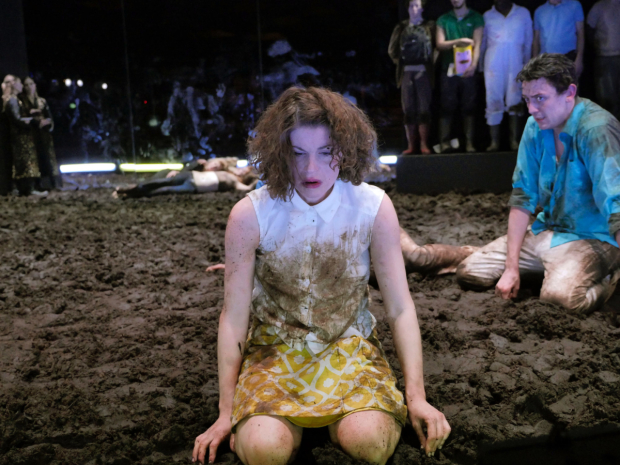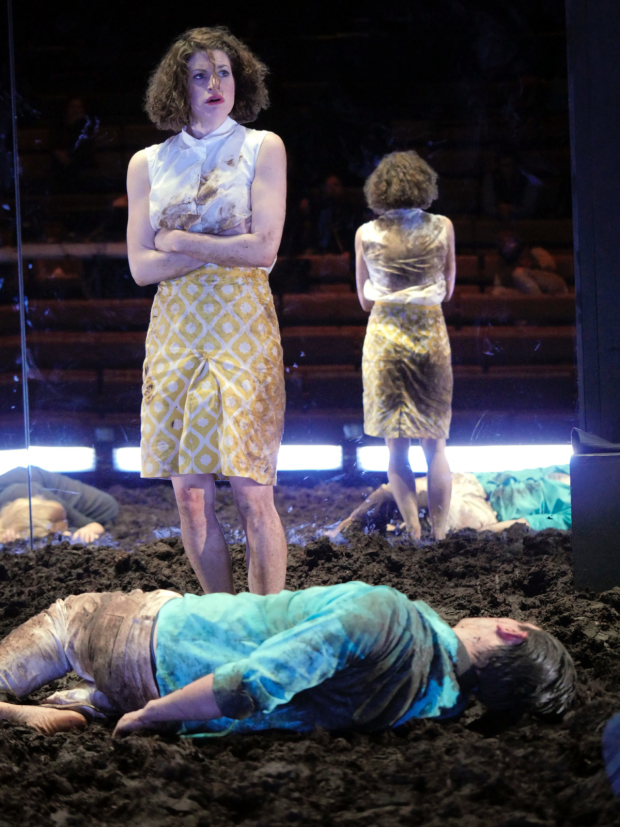Jemima Rooper: 'Our Midsummer isn't naïve or innocent, it's complicated'

© Keith Pattison
After making her first foray into acting on TV (she was 12 when she made her professional debut), Jemima Rooper's theatre waves became big in 2008 after she took the lead in Rebecca Lenkiewicz‘s play at the National, Her Naked Skin. Since then she has starred in One Man, Two Guvnors opposite James Corden, Blithe Spirit opposite Angela Lansbury and most recently in Hand to God in the West End last year, opposite Harry Melling. Over her career she has portrayed a fair number of lesbians and ghosts and now she’s about to take on her first Shakespeare play, appearing as Hermia in Joe Hill-Gibbins‘ dark version of A Midsummer Night’s Dream.
Joe Hill-Gibbins has been very playful with his past versions of Shakespeare plays, is it easy to trust him as a director?
I would say so, otherwise none of us would be in the room with him. The things he gets us to do… If he had told us what was happening before [we got into the rehearsal room] we'd be like – hang on… We’re going to some quite dark places with it.
Midsummer is not often played for darkness…
There’s a lot of facing up to yourself in lots of different ways. It’s pretty exhausting. We are definitely erring on the slightly more sinister side of what’s in [the play]. In an early workshop, [Hill-Gibbins] explored the lovers and whether it works when they aren’t played naïve, which is what’s written. It looks a lot at past relationships. It’s not naïve and it’s not innocent. It’s complicated. Which is what is really interesting about it.
Is there still humour?
The humour does come out, and the mechanicals are funny. I think the comedy will come from us playing the absolute awful truth of it. I basically spend the whole lovers quarrel being told I’m a dwarf. I’m straining to be stupid with it, but we are having to play it dark. It’s a dark comedy.
Are you worried about the reaction people will have to a very different version of A Midsummer Night’s Dream?
In the rehearsal room it all feels right. It’s mysterious and haunting and magic in a really earthy way. It feels exciting and nice to be trying an unusual version of it. I think people will either love it or hate it, but people coming to the Young Vic will know that they might not get your usual Midsummer.
You have already worked with Joe, was it easy to say yes to this?
It was a mixture of things. This is my first Shakespeare. It’s always been a thing [I’ve wanted to do]. But I’ve done workshops, I have studied Shakespeare, I get it. Some directors and practitioners are really militant about metre, rhyming couplet and pentameter. But the nice thing with Joe is that you feel instantly that he wants to respect the meaning of it.

© Keith Pattison
Was there a specific reason why you hadn’t done a Shakespeare before?
I worked a lot in TV when I was younger, and because I didn’t go to drama school, I just wasn’t seen for theatre. But then everything changed the minute I did a play at the National. I suddenly got loads of auditions for theatre. I don’t do nearly as much TV now and I’m slightly skint.
Was taking on the lead role in Her Naked Skin at the National quite daunting?
It was the most magical experience in every way, Howard Davis directed it and Rebecca Lenkiewicz wrote the script. I remember reading it and thinking: this is mine. Most of the time you read things and go – anyone could do this, including my cat. But this was one of those moments where I would have been heartbroken if I’d not got it.
You got into acting through TV at an early age, was TV why you wanted to act?
I got into acting because I wanted to do theatre. And actually musicals, and I’m very sad that I went down the serious actor route and never learnt to dance and sing properly. I keep trying, but no one wants me. They haven’t seen me really drunk singing amazing Bon Jovi, is the problem.
You’ve recently been doing more theatre than TV, would you like to make it more even?
I would. It all went a bit tits up when I had a kid. I did Hand to God last year and the baby was six months old and it felt a bit precarious, but it was fine. I didn’t have loads to do and I knew Harry Melling. I’ve never before needed to know who they were thinking of casting, but for this I was like: I don’t want to spend five months with a twat.
Was it at school that you got into acting?
No, I went to quite academic schools. But there was a girl in my school who was older, who was in Grange Hill. And I watched stuff like Oliver and Annie thinking: those kids are doing that, so I want to do it. An agent lived on our road and they sent me up for a few things. My mum had conceded because she thought I could do some auditions and I wouldn’t get the job and I would be put off. I didn’t get any of the jobs and I was heartbroken, but I still wanted to do it. It’s a kind of sadomasochist thing that every actor has. It was in my local drama group at age 11 when I played the Artful Dodger opposite the guy who is now Example, the rapper, as Oliver, that I got seen by an agent.
What is it like being back at the Young Vic?
This sounds awful but I love the bar. The theatre feels really fun and current and important. Our design team are German, and Joe has a very European way of working. Not having a prescribed idea at the beginning of things is really brave from Joe’s point of view. Everyone brings a bit of themselves to the production.
What’s next?
I would love to have a plan. When I’m next up the duff I am going to write a movie, but the character’s age has got older and older as I have put off writing it. Whenever I have tried to be tactical with work, it’s ended up being the opposite.
A Midsummer Night's Dream runs at the Young Vic until 1 April.










